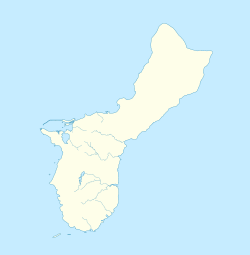Fort San Jose facts for kids
Quick facts for kids |
|
|
Fort San Jose
|
|
| Nearest city | Umatac, Guam |
|---|---|
| Area | 2 acres (0.81 ha) |
| Built | 1802 |
| NRHP reference No. | 74002041 |
| Added to NRHP | May 1, 1974 |
Fort San Jose was an old Spanish fort on the island of Guam. Today, Guam is a territory of the United States. This fort was built on a hill north of the village of Umatac. From this spot, it could watch over Fouha Bay and Umatac Bay. These bays were important stops for Spanish ships called galleons. These ships traveled between Manila in the Spanish Philippines and Acapulco, Mexico. They would stop here to get fresh water and supplies.
History of Fort San Jose
The fort was built around the year 1802. This happened when Vicente Blanco was the Governor of the Marianas. The main job of Fort San Jose was to protect the sea route. This route was used by Spanish galleons.
However, the route became less important after 1815. This was because Mexico became an independent country. After that, the fort was no longer needed. By the 1850s, Fort San Jose was already in ruins. It has been a ruin ever since.
In 1974, the site of the fort was added to the National Register of Historic Places. This list helps protect important historical sites in the United States.
What the Fort Looked Like
Today, only the foundations of Fort San Jose remain. These parts show that the fort was shaped like a wide semicircle. The walls at the bottom were about 2 feet (0.6 meters) thick. In some places, these old walls still stand about 4 feet (1.2 meters) high.
About 36 feet (11 meters) southeast of the fort, you can find the remains of a watchtower. This tower was used to keep an eye on the bays. Its remaining walls are about 5 feet (1.5 meters) tall.
See also
 In Spanish: Fuerte San José (Umatac) para niños
In Spanish: Fuerte San José (Umatac) para niños
- National Register of Historic Places listings in Guam


